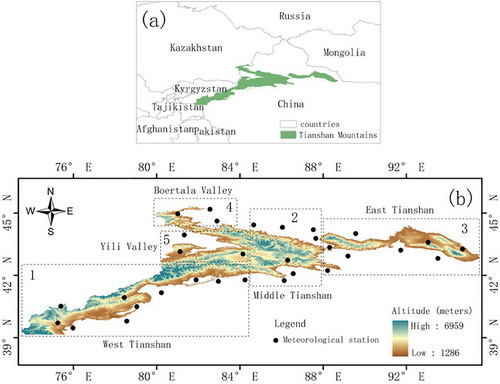As abundant distribution of glaciers and snow, the Tianshan Mountains are highly vulnerable to changes in climate. Based on meteorological station records during 1960–2016, scientists detected the variations of air temperature and precipitation by using non-parametric method in the different sub-regions and different elevations of the Tianshan Mountains. The mutations of climate were investigated by Mann-Kendall abrupt change test in the sub-regions. The periodicity is examined by wavelet analysis employing a chi-square test and detecting significant time sections. The results show that the Tianshan Mountains experienced an overall rapid warming and wetting during study period, with average warming rate of 0.32 °C/10a and wet rate of 5.82 mm/10a, respectively. The annual and seasonal spatial variation of temperature showed different scales in different regions. The annual precipitation showed non-significant upward trend in 20 stations, and 6 stations showed a significant upward trend. The temperatures in the East Tianshan increased most rapidly at rates of 0.41 °C/10a. The increasing magnitudes of annual precipitation were highest in the Boertala Vally (8.07 mm/10a) and lowest in the East Tianshan (2.64 mm/10a). The greatest and weakest warming was below 500 m (0.42 °C/10a) and elevation of 1000–1500 m (0.23 °C/10a), respectively. The increasing magnitudes of annual precipitation were highest in the elevation of 1500 m–2000 m (9.22 mm/10a) and lowest in the elevation of below 500 m (3.45 mm/10a). The mutations of annual air temperature and precipitation occurred in 1995 and 1990, respectively. The large atmospheric circulation influenced on the mutations of climate. The significant periods of air temperature were 2.4–4.1 years, and annual precipitation was 2.5–7.4 years. Elevation dependency of temperature trend magnitude was not evidently in the Tianshan Mountains. The annual precipitation wetting trend was amplified with elevation in summer and autumn. The strong elevation dependence of precipitation increasing trend appeared in summer. 
Locations of Tian Shan Mountains and selected meteorological stations. |

